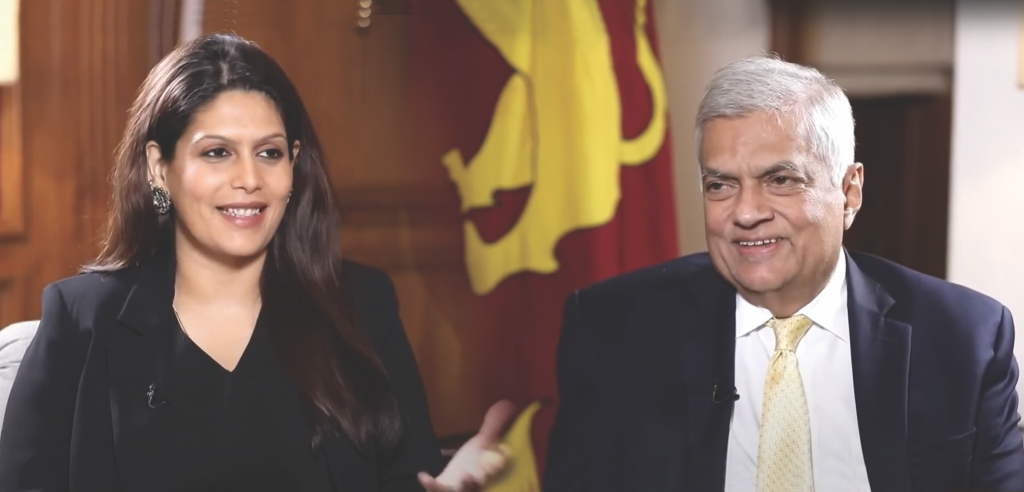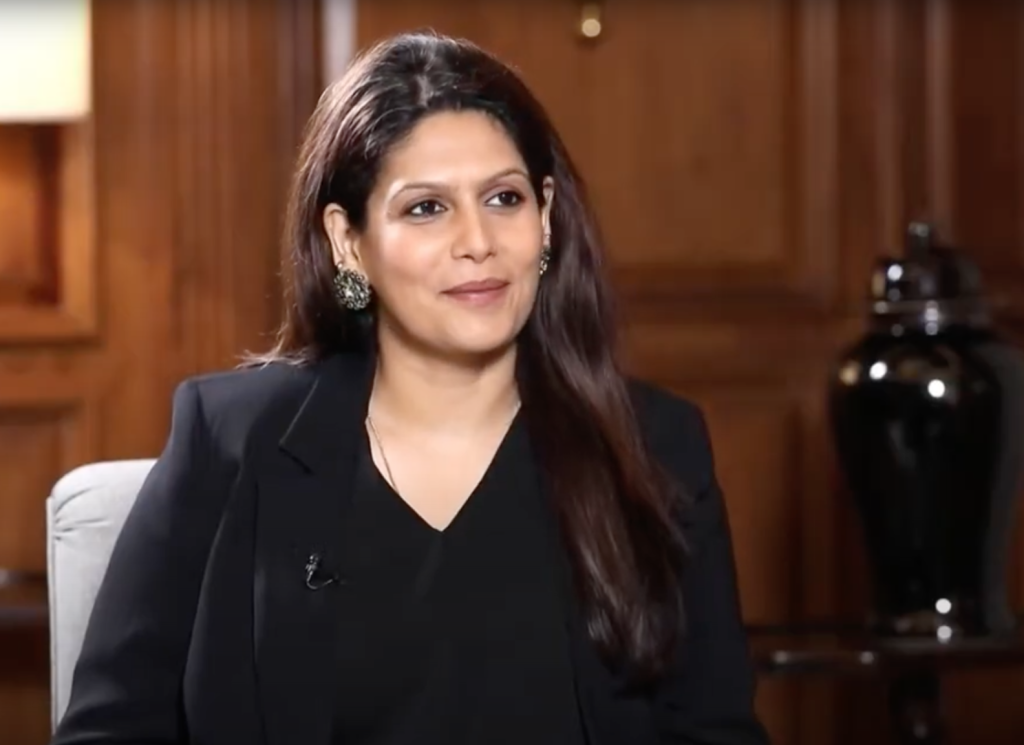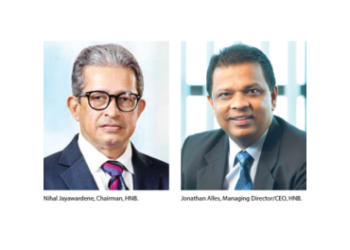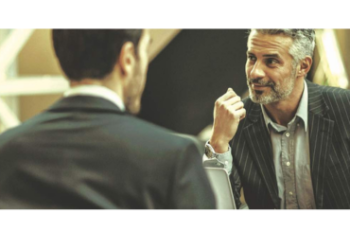I have survived, said President Ranil Wickremesinghe, starting the conversation with Firstpost’s Palki Sharma. He sat with the Indian host to speak on many subjects, a conversation that drew many interesting responses from Wickremesinghe, who, in his inimitable style and well-honed diplomacy, fielded all the questions that conveyed the ubiquitous political maxim ‘a friend to all and enemy of none’. But through all that, he also communicated his resolve to give leadership to the country’s recovery and resurgence, an attitude of determination and calm confidence that Sri Lanka is not in perdition but on a steady journey towards definitive redemption.
Words Jennifer Paldano Goonewardane.

President Ranil Wickremesinghe being interviewed by Indian journalist and news anchor, Palki Sharma.
Beginning economic recovery with normalcy, law and order
The conversation began with the most talked about subject – Sri Lanka’s road to recovery. Describing the last year as challenging, Wickremesinghe was nonetheless triumphant about the progress, explaining that the government managed to pass through the period and establish stability by addressing the economic crisis while successfully arriving at the last lap of negotiations with creditor nations who have agreed to help the country with debt restructuring, as the government in tandem has launched restructuring measures within the country with broad fiscal measures. With some normalcy returning to the country, external interest seems to be gathering momentum, as evidenced by the growth in tourism, said Wickremesinghe. Responding to Sharma’s question whether he thinks that he had the most challenging job in the country, Wickremesinghe responded in the affirmative while acknowledging that many others partaking in driving the recovery process, such as Treasury officials, feel the same, with much pressure on them, to deliver the intended numbers to help him continue the recovery program.
As the President, Wickremesinghe, said, the most challenging part was conveying the truth to the people, of making the country realize the problems it was facing, to tell the people that he did not have a magic wand and had nothing to give to them. Instead, he appealed to the masses to bear the pain and difficulties for some more time. At the same time, he promised to do his best to give them whatever relief possible, which he said was the most challenging job he had, which, as the host pointed out, was not a message that politicians would generally want to tell their constituents, negative messages never went well with the masses, Wickremesinghe said. At the same time, the truth was brutal to hear. He gave them hope for a better future, but one must necessarily pass through a difficult phase to reach the goal.
Speaking on how he restored order when all hell broke loose while his home came under attack and vital places of administration faced the threat of invasion, Wickremesinghe said that the first step was to mobilize the security forces to establish law and order. He said that when the rioters took over the prime minister’s office, followed by attempts to take over the Parliament, he deemed ‘enough was enough’ and ordered the Army to do what was necessary to safeguard Parliament. From then on, the government decided to enforce law and order. That stance, he said, was followed by outcries of accusations of human rights violations, but finally, there was stability.
The progress made
Wickremesinghe said the Sri Lankan economy was gradually coming out of the woods. Sri Lanka has met the IMF benchmarks, but two issues persist – balancing the budget and the trade deficit, which is not in Sri Lanka’s favor. He admitted that as far as the domestic budget is concerned, the country has to increase revenue, a process partly affected by the backwardness of the revenue collection machinery, which has focused only on a few. Secondly, the economy has yet to pick up, which again impacts revenue, and predicted that the situation will improve by 2025. Wickremesinghe insisted that the country could no longer rely on its traditional economic model but had to modernize, which is among his plans in implementation right now. In the face of debt servicing, the country’s most significant expenditure, Sri Lanka still struggles to generate adequate revenue. This setback Wickremesinghe said could be met only through faster economic growth, which entails restructuring and removing the remaining fetters to growth. He insisted that Sri Lanka has fulfilled IMF benchmarks and expressed his confidence in receiving the next tranche of the IMF bailout money.
Accountability for the economic crisis
The conversation then focused on holding individuals accountable for the country’s economic crisis. A recent Supreme Court ruling found two ex-presidents, an ex-finance minister, and senior government officials violating public trust by mishandling the economy. The host bluntly asked Wickremesinghe whether he agreed with the view of the Supreme Court. The President responded that the crisis occurred during a Rajapaksa-led government; hence, the Rajapaksas have their share of responsibility. It is up to them to apologize to the country. Beyond that, Wickremesinghe veered to the more considerable chaos that unfolded in the aftermath of the protests and the ousters.
Explaining the sequence of events, Wickremesinghe said that when Mahinda Rajapaksa stepped down from the premiership in May 2022, Gotabaya Rajapaksa had invited the Opposition Leader to form a government, which is customary. Wickremesinghe believes that the Opposition Leader should have taken over because he had the government’s backing. However, they ducked it, and thereby, that led to a collapse in the political system with no one to take responsibility. Considered in sequence, he said from the time the crisis erupted and the delay in going to the IMF and the resignation of Mahinda Rajapaksa and the Opposition’s failure to take over government followed by the resignation of Gotabaya Rajapaksa, even after which the Opposition was unwilling to take any responsibility had led to a break down in the whole system. He pointed out that there were a lot of irresponsible actions by everyone. Hence, one has to look at the entirety of the situation that had led to a collapse in the system.
He said the situation would have been worse had no one taken over the government when the Rajapaksas left. The political system broke down because those who provoked the people with slogans were unprepared to make hard decisions. The whole system collapsed not once but twice, pointed out the President, who said no one has a clean record. Mahinda Rajapaksa and Gotabaya Rajapaksa were in office when the economic crisis began. However, it was a gradual process that became full-blown. Wickremesinghe said he could not imagine what would have happened had he not been in parliament to take over the country when the Opposition backed out.
The host, while agreeing with Wickremesinghe’s case, argued that his position might earn the ire of his critics who may find his words partial to the Rajapaksa family, which the head of state refuted, admitting at this point the Rajapaksa culpability in causing the economic crisis while telling that all the critics fled when the ball was in their court, leaving him with the responsibility of taking over the country.
Not a surrogate
Wickremesinghe’s critics have branded him a Rajapaksa surrogate. And that too for several reasons. One is the backing he gets from a Rajapaksa-led party. Most recently, he attended a party to celebrate Mahinda Rajapaksa’s birthday. Wickremesinghe denied being a Rajapaksa surrogate, for whom attending the party was nothing unusual as the two politicians always wished each other on their respective birthdays, and this time, he participated in the party on the invitation of his son Namal, which he would do for any member of parliament who would invite him. He added that as it is, the SLPP is split, with some working with him while the others are working with the SJB. Likewise, he said the whole of SJB does not support Sajith Premadasa. In a non-regular parliament with divisions within every party, Wickremesinghe got a majority vote because he called upon all to unite to pull the country out of its current situation.
China and Debt Restructuring
China is Sri Lanka’s largest bilateral creditor and has been in the news since Sri Lanka began debt restructuring negotiations. From the outset, China had decided to take a different path. In response to China’s refusal to be part of the debt restructuring dialogue, Wickremesinghe said that Sri Lanka has been negotiating with China separately, as China is not happy with the IMF and World Bank terms, wanting a more prominent role and hence is taking a separate path out of the collective process, making it difficult for Sri Lanka, but now has conveyed its consent to the process. However, sidestepping the host’s description of China as a loan shark, Wickremesinghe said that he knew that China would play it separately and differently but also knew that with others responding positively, China would eventually come on board and respond favorably. Negotiating debt restructuring amid geopolitical dynamics was a complex affair, according to Wickremesinghe. He said the Chinese President had promised to send his country’s debt restructuring requirements when they met during the Belt and Road Forum in Beijing. Sri Lanka had also suggested a single platform for debt restructuring, just like India’s attempt to unite all parties, which China had refused to join. Trying to bring two groups together was not easy, he said; in this instance, China’s refusal stemmed from its issues with the IMF and the World Bank, to whom it was trying to send a message by its stance, and hence, Wickremesinghe said that it was up to them to sort out their issues. Nonetheless, he expressed his gratitude to India, the other countries, and the multilateral agencies for assisting Sri Lanka during its dire need.
The Chinese connection
Sri Lanka is in the middle of the power battles between India and China and between the USA and China. With concerns raised about China’s intentions in the Belt and Road Initiative, Wickremesinghe appreciated the initiative for making funds available for development, which many countries who need help to fulfill their infrastructure needs have accepted. He pointed out that this is the only country that gives extensive funding through the BRI for development. He said that the BRI-led assistance is the only hope for African countries. However, Sri Lanka receives aid from several countries, pointed out Wickremesinghe, who noted that the difference with Chinese assistance is that they give it faster, allowing a government to implement a project well in time for the next election.
In contrast, being scrupulous, the Japanese would deliver their aid much later. Making a comparison, Wickremesinghe said Chinese support helps to show the people that a government has done something. In contrast, with Japanese assistance, a government can show that there’s more to follow, a political formula he said many countries use.
Meanwhile, as China has indicated its desire to extend the China-Myanmar Economic Corridor (CMEC) to Sri Lanka, the newest of the six land corridors under the BRI, Wickremesinghe said that it is a matter of Sri Lanka connecting to an existing corridor. Hence, there is no special thrust to go on board the initiative. The CMEC extends to Africa and intends to boost trade between China and African countries. Wickremesinghe is keen for Sri Lanka to join, especially in establishing connectivity with African ports. China’s proposal, he said, is not a matter of China trying to rope Sri Lanka into another initiative but instead for Sri Lanka to take on the opportunity to integrate. African ports, said the President, are going to be essential, and linking them with Myanmar would create a new route.
Responding to India and US concerns regarding the visit of Chinese vessels to Colombo, alleged as spy vessels, Wickremesinghe said that the government had sought evidence. However, Sri Lanka received none. He believes they were civilian ships, not spy ships, as alleged, and that Sri Lanka would allow foreign vessels from any country for research purposes. The President took umbrage at the attention Chinese ships received when similar vessels from other countries also called over on Colombo. Meanwhile, Wickremesinghe said Sri Lanka will develop its hydrography unit and vessels, allowing it to conduct research around India and China. In response to whether Sri Lanka would allow a Chinese military vessel to dock in Colombo, he said that Sri Lanka has always allowed military ships from all countries to dock in Colombo.
Wickremesinghe agreed that India has legitimate security concerns and assured Sri Lanka would heed India’s concerns when navigating its relationship with China.
India – Sri Lanka relations
Recalling his initial dealings with an Indian government, Wickremesinghe said that his first encounter with India’s leadership began during the tenure of Prime Minister Moraji Desai, when Atal Bihari Vajpayee was the Minister of External Affairs, acquainting the latter in 1974. India-Sri Lanka relations remained strained under Indira Gandhi. But Rajiv Gandhi resolved those issues, said Wickremesinghe, a relationship that improved from then onwards, peaking under the premiership of Narasimha Rao, who was a contemporary in the education ministry with Wickremesinghe and hence knew him well, with the Sri Lanka President revealing that he used to seek his advice even after he retired from politics. Speaking on India’s role in resolving Sri Lanka’s economic crisis, Wickremesinghe appreciated India’s role in strengthening the fallen economy with funding and appreciated the role played by Indian Prime Minister Narendra Modi, Finance Minister Nirmala Sitharaman, and Foreign Minister S Jaishankar.
Speaking on his relationship with the current Indian Prime Minister, Wickremesinghe said that his relationship with Modi goes back to his days as Gujarat’s chief minister. When the President met Modi in July 2023, the interchange had centered on Indo-Sri Lanka relations and the way forward after the crisis, viewing the Joint Vision that the two leaders had released following the meeting as a step ahead. The meeting also focused on forging economic partnerships in promoting Indian investment in Sri Lanka, Indian investment in the south port and west terminal, the development of the Trinco port, investments in renewable energy, trade liberalization, and tourism.
Maldives ‘India Out’ campaign
Recently, the focus has been on Maldives’ newly elected President, Mohamed Muizzu’s India Out campaign, which saw him swiftly implement a campaign pledge to remove India’s military presence, much to India’s chagrin. When quizzed, Wickremesinghe said that Muizzu only fulfilled an election pledge, which he reiterated during his first presidential speech. However, he said rather than abandoning the island nation after it asked Delhi to withdraw its military, India should forge ahead to strengthen its relationship with the Maldives. He also revealed that the Maldivian President told him he needed India’s help during discussions with Wickremesinghe, who attended his inauguration. His advice to the Maldivian President is to implement the process gradually.
As China has indicated its desire to extend the China-Myanmar Economic Corridor (CMEC) to Sri Lanka, the newest of the six land corridors under the BRI, Wickremesinghe said that it is a matter of Sri Lanka connecting to an existing corridor…Wickremesinghe is keen for Sri Lanka to join, especially in establishing connectivity with African ports.
Easter Sunday Attacks
Expressing his views on the Easter Sunday attacks and allegations of collusion by government officials, Wickremesinghe revealed that the Sri Lankan Catholic Church had received a copy of the Presidential Commission Inquiry report, including several other documents related to the attacks, which makes more than twenty thousand pages and pledged to meet and discuss with the hierarchy of the Church once they complete studying the documents.
The host revealed the contents of a letter supposedly written by the Head of the Catholic Church to the Australian government, asking it to pressure the Sri Lankan government regarding the Easter attacks. Wickremesinghe, doubting whether the Australian government would respond to the request, said that the intelligence services had concluded the attack as locally masterminded. He once again urged the leaders of the Catholic Church to study the report and then come for a discussion with the government. The Opposition has accused the President of reneging on his promise to invite Scotland Yard to investigate the attacks. But Wickremesinghe alleged that everyone was making politics out of the Easter Sunday attacks and urged those using it to gain leverage to study the report’s contents first. Regarding keeping India briefed on the progress of the investigation, as eleven Indians had been victims of the Easter attacks, the President said that India conducted its research and that New Delhi should be aware of what took place that day, having kept Colombo informed of an impending attack.
Calling out Western double standards
Wickremesinghe has been in the news for hitting at the double standards of the West over human rights concerning Israel’s attack on Gaza, which has resulted in thousands dying, including children. Wickremesinghe revealed that one of the conditions that the West had imposed on Sri Lanka was to address Muslim concerns. However, today, as Palestinians lay cornered and needing intervention, it was the West that was not speaking to Muslims in Gaza. He reiterated the call for a ceasefire in Gaza. He said that the Western double standards on human rights is a point extensively spoken about and that has been a central point of contention and division between the West and the South. Wickremesinghe said that it was not just him calling for a Gaza ceasefire. The people of Israel themselves were pushing the government to focus on rescuing the hostages over hostilities. Wickremesinghe also spoke about Western condemnation of Sri Lanka at the end of its internal conflict in 2009, accusing the island’s troops of killing civilians. In contrast, Israel defends its use of force and civilian casualties in Gaza on the basis that Hamas uses civilian infrastructure and civilians as human shields, claiming that military strikes are the only way to deal with them.
The Tamil question
In addressing Tamil autonomy in Sri Lanka, Wickremesinghe met with Tamil political parties and members of parliament and pledged his support for implementing the thirteenth amendment to the constitution sans Police powers, but the attempt has received mixed reactions. But the President explained that most Tamils and Tamil members of parliament had accepted his offer, although the problem lies with the divisions among the Tamil parties. He highlighted attempts to return land that belonged to the Tamil people, which are now under the purview of the Department of Forests and the Department of Wildlife Conservation. The issue is currently under discussion, with negotiations between the members of parliament, the relevant government departments, and the district administrators, who will use the 1985 map in their decisions. He said the land issue was a significant one being dealt with now.
Meanwhile, India, according to the host, had in September criticized Sri Lanka’s record on dealing with the issues of the Tamil people, telling the UN Human Rights Council about inadequate progress made in this regard. Expressing his surprise at India making such a statement against Sri Lanka, Wickremesinghe said that he disagrees with the Indian contention as India has witnessed the progress Sri Lanka has made in resolving Tamil concerns since 2022, in which the Tamil people and members of parliament are integral. The President acknowledged that there are areas for improvement concerning integration, an issue in rural areas rather than the cities, where all groups must have equal access to facilities and infrastructure. None of the communities, he said, can expect the facilities available in the district administrative centers to be available in the interiors, something the people could enjoy later. Reiterating his commitment to return lands to the Tamil people, Wickremesinghe spoke of the potential for growth in the Northern Province, revealing that most renewable energy projects are located in the north, predicting that the north would be prosperous in the next ten years.
Indian elections
As India heads to the polls in 2024, the host asked Wickremesinghe who stood a better chance at winning the next election. In response, the President said that the provincial election would be a precursor to the outcome of the national polls. He said that the BJP has an advantage as a single party with a single leader, whereas the Opposition has yet to come together. As to what Colombo would prefer, continuity or change, Wickremesinghe said Sri Lanka must deal with whatever happens in India.
Who’s running cricket in Sri Lanka?
The host spoke about cricket in Sri Lanka and the bothersome politics surrounding its administration, with opposition political parties in Sri Lanka accusing the administration of Sri Lanka Cricket of requesting the ICC to suspend Sri Lanka’s membership. Wickremesinghe said it was usual for the ICC to suspend Sri Lanka’s membership after the sports minister appointed an interim committee, an outcome the government had tried to stop as the hosts of the under-19 World Cup. The event would have bolstered tourism, but unfortunately, Sri Lanka lost out on that opportunity. He said that he would wait for the court’s decision regarding the interim committee, following which the government would negotiate with the ICC to restore membership. A committee of ministers is studying the past activities of Sri Lanka Cricket and has spoken to its members. Wickremesinghe said that he intends to introduce legislation taking out the power of the sports minister to intervene and interfere in sports bodies and politicize them, which has been going on since 1973. He firmly believes in changing that practice with a new draft law prepared in this regard.
Is Jay Shah running Sri Lanka Cricket, asked the host, which Wickremesinghe rejected, claiming that Shah’s name is being dragged unnecessarily into the affair because the minister and his cohorts believe he is supporting the SLC administration. The President had spoken to Shah to apologize, and Shah, in response, had said that he would support any legal administration at SLC and that membership suspensions are decided by the ICC and not by him as alleged.
Next presidential election
Always the artful dodger, Wickremesinghe refused to reveal his plans regarding his future, insisting that his first job was to put the economy back in order, and after that, he would decide what he wanted to do. As the host persisted and asked what party he would align with if he chose to contest the next presidential election, Wickremesinghe claimed to be an independent president without any party affiliation as he was appointed under unique circumstances while representing the United National Party in Parliament. The question then arises whether he should align himself with any party in the next election, which does not matter right now, said Wickremesinghe, as he has yet to decide about his future.






